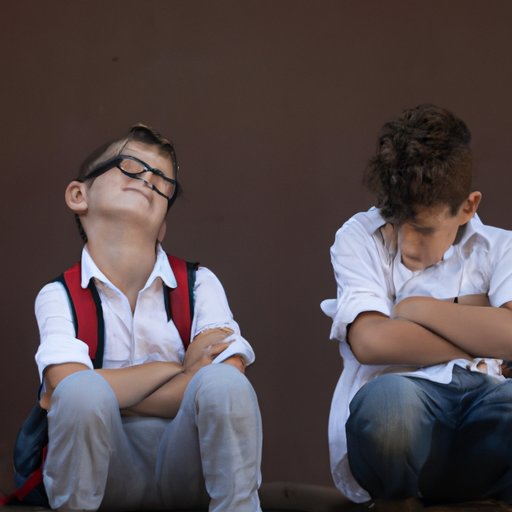Introduction
Bullying is a big issue that affects kids worldwide. It can come in various forms, including physical abuse, emotional abuse, and cyberbullying. It can happen at school, in the neighborhood, or even at home. The issue has become too prevalent and is a significant cause of concern for parents, teachers, and mental health professionals. In this article, we explore the possible reasons for kids to bully, the impact of bullying on children, the signs to look out for in a child who bullies, addressing bullying in schools, the long-term effects of childhood bullying, and how parents can prevent their children from bullying.
Possible reasons for kids to bully
Kids can bully others for several reasons, including:
- Family issues: Bullying can be a way for a child to release pent-up emotions that they are unable to express at home. Children from abusive households may vent their frustrations by bullying others.
- Lack of social skills: Kids who struggle to make friends or socialize well may turn to bullying to gain social status or recognition.
- Peer pressure: Sometimes, children can be pressured by their peers to bully others to fit in or gain acceptance.
- Seeking attention: In some cases, children may bully others to draw attention to themselves, especially if they are not getting enough attention at home or at school.
- Low self-esteem: Kids who feel inadequate or inferior to others may bully others as a way to feel powerful or gain a sense of control.
- A way to deal with personal problems: Kids who have personal issues like mental health problems or stress may lash out at others through bullying.
The impact of bullying on children
The effects of bullying can be devastating, not just for the victim but also for the bully. Some of the significant impacts include:
- Effects on the bully: Children who engage in bullying are at risk of becoming aggressive and violent as they grow older. They may also have emotional issues, such as anxiety, depression, and a lack of empathy.
- Effects on the victim: Children who are bullied can suffer from anxiety, depression, and low self-esteem. They may also develop physical symptoms such as headaches, stomachaches, and sleep disorders.
- Importance of addressing the issue: Bullying can impact a child’s mental and physical health in the short and long term. It can also affect their academic performance and social development. Addressing the issue is crucial to prevent long-term damage to the victim and the bully.
Signs to look out for in a child who bullies
Parents and teachers should be mindful of the following signs that a child may be bullying others:
- Behavior changes: Kids who are bullying others may become more aggressive, argumentative, and irritable
- Aggressive behavior: A child who bullies may show signs of physical abuse such as hitting, kicking, or pushing.
- Lack of empathy: A child who is bullying others may show little empathy for their victims and may not feel remorse for their actions.
- Isolation: A child who bullies others may become withdrawn and isolate themselves from social situations.
- Substance abuse: Kids who bully others may turn to alcohol or drugs to cope with their emotions.
- Antisocial behavior: Bullying can be a red flag for potential behavioral issues, including delinquency or crime.
Addressing bullying in schools
Schools can help prevent bullying by taking the following measures:
- Education and awareness campaigns: Schools can provide information to students, parents, and staff about what bullying is and how to recognize it.
- Counseling and support: Schools can provide counseling and support to both the victim and the bully to help them overcome their issues.
- Intervention programs: Schools can develop intervention programs that bring together victims and bullies to learn about the impacts of bullying and develop better ways to interact positively.
- Collaboration with parents: Schools can work with parents to identify and address bullying by involving them in the process of setting up policies and interventions.
The long-term effects of childhood bullying
The effects of childhood bullying can have long-term impacts beyond childhood. Some of the lasting consequences include:
- Mental health issues: Victims of childhood bullying may be at higher risk of developing mental health issues such as anxiety and depression.
- Relationship problems: Kids who were bullied in childhood may develop trust issues and have problems with intimacy in their future relationships.
- Lowered self-esteem: Bullying in childhood can lead to low self-esteem and a negative self-image that can persist long into adulthood.
- Impacts on overall quality of life: Childhood bullying can have consequences in other areas of life, including career and financial success.
How parents can prevent their children from bullying
Parents can help prevent their children from bullying others by:
- Teaching empathy: Parents can encourage their children to put themselves in other people’s shoes and develop a sense of empathy towards others.
- Promoting good communication: Parents can foster good communication habits in their children and promote healthy ways of expressing emotions.
- Encouraging healthy social interactions: Parents can encourage their kids to make friends and participate in social activities to develop their social skills and learn to work well with others.
- Setting good examples: Parents can set a good example for their children by modeling respectful and empathetic behavior towards others.
- Managing technology use: Parents can be mindful of how much time their kids spend on technology and teach them healthy screen habits.
Conclusion
Bullying is a critical issue that has far-reaching effects on children and society as a whole. It is essential to understand the possible reasons for kids to bully, the impact of bullying on children, the signs to look out for in a child who bullies, how to address bullying in schools, the long-term effects of childhood bullying, and how parents can prevent their children from bullying. By addressing this issue together, we can make the world a better place for all.
